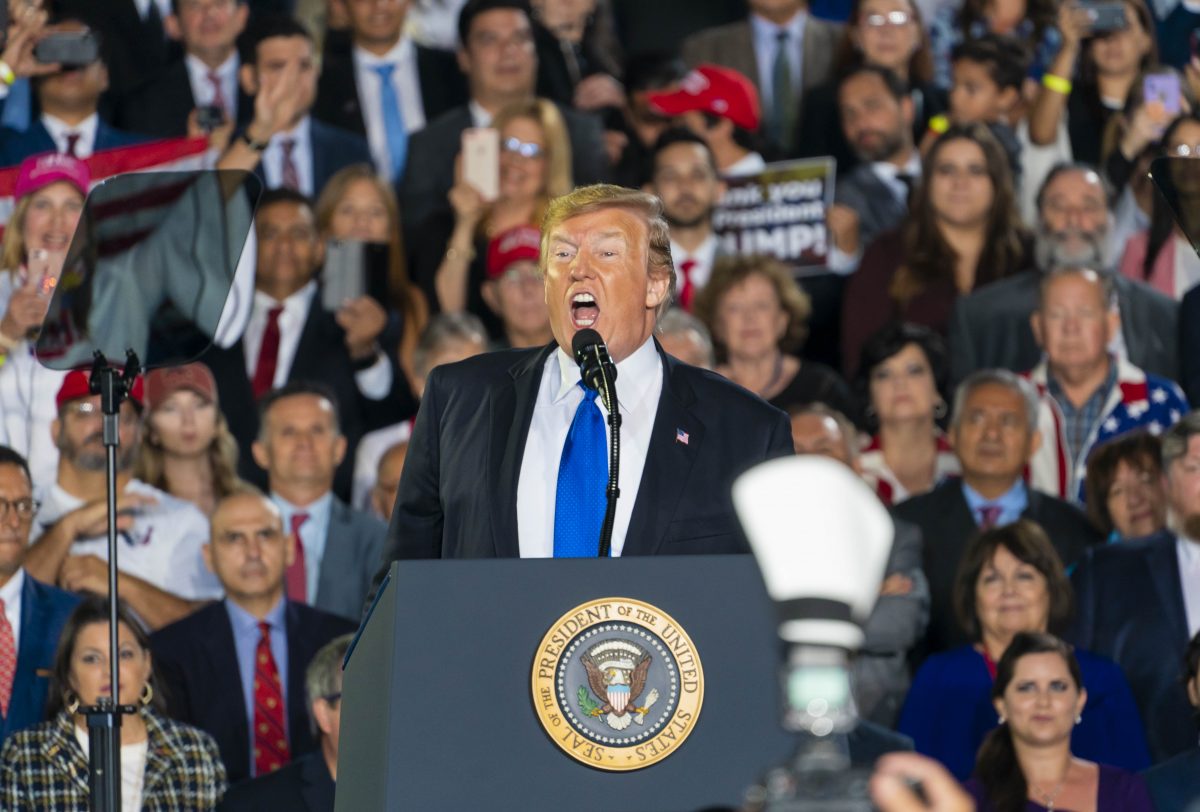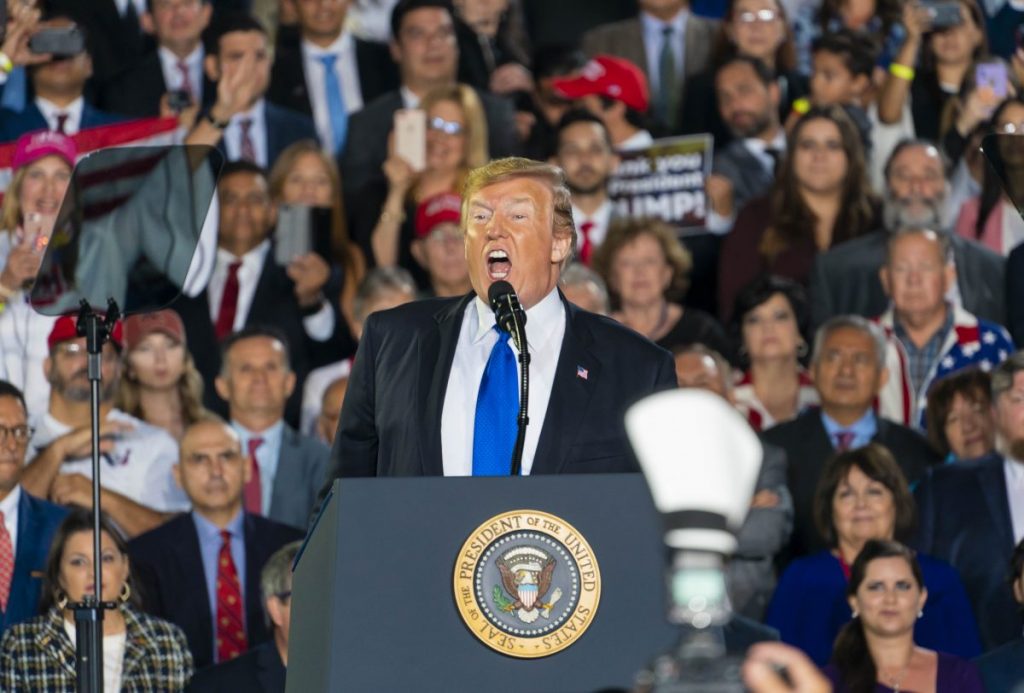

While President-elect Joe Biden is preparing to take office, many prominent individuals, including sitting President Donald Trump, are spreading rumors about voter fraud. UM professors explained these rumors are inaccurate.
“There is no credible evidence of voter fraud. Period,” said Professor Casey Klofstad, an associate professor in the department of political science.
At the onset of the Covid-19 pandemic, the Biden campaign and the Democrats encouraged people to have a plan to vote safely and utilize vote-by-mail in states where it was available. On the other hand, the Trump campaign made unsubstantiated claims that voting-by-mail is fraudulent and encouraged his supporters to vote in-person on election day.
Victor Rivera, a freshman majoring in political science who voted early and in-person, believes that the Trump campaign hurt themselves in attacking the vote-by-mail process.
“A group of people that may have not been able to vote in-person, who simultaneously did not trust the mailing system, were led to not vote at all due to the lack of trust in the system,” Rivera said.
Joseph Uscinski, an associate professor in the department of political science who specializes in elections, the media and conspiracy theories, said Trump’s claims are erroneous.
“He’s called into question the entire process, despite the fact that some states have used mail-in ballots for some time,” Uscinski said. “There is no reason to suspect fraud, but he has engaged in that rhetoric, and that focused the attention of his supporters on that.”
This stark divide between Republicans and Democrats on vote-by-mail is what contributed to what many called the “red mirage,” meaning that on election day, Trump was in the lead as many of his supporters voted in-person that day.
The divide has also played out amongst UM faculty. On Nov., UM law professor Daniel Ravicher tweeted that Democrats were trying to steal the election. In his tweet he cited Democratic leaning cities Detroit, Philadelphia and Atlanta as deliberately slowing counting to “deny” Trump reelection. This tweet and others spurred reactions from law students and faculty alike.
Klofstad explained this isn’t true.
“In states where you saw shifts, those states counted election day ballots first and then went into mail-in ballots. So what you saw, just the way the math works, is this glut of Republican votes at the outset, showing an advantage for the president,” Klofstad said. “Pennsylvania is a good example, because when Pennsylvania started counting the mail-in ballots, you see the lead the president had shifted to a lead, and the eventual called outcome, for now President-Elect Biden.”
Allie Redford, a freshman studying marine science and biology who voted by mail, notes that the “red mirage” is helping support Trump’s beliefs that the election was rigged.
“It’s an easy conclusion that you could make,” Redford said. “But, if you look at what he told his supporters, which was to vote in-person, and if you compare that to what Biden told his supporters, which was to be safe, to wear masks and to vote using mail-in ballots, then it’s kind of obvious that it’s not this big conspiracy— it’s because of what he said.”
In spite of this, many of Trump’s supporters have strengthened their claims that the election was rigged through these mail-in ballots, which are legal.
“A lot of people when they lose will believe that they were cheated, and that’s quite normal,” Uscinski said. “They will make up theories to explain how and why they were cheated.”
According to Klofstad, this behavior can be explained by the phenomenon of motivated reasoning.
“In the case of the president and his supporters, it does not feel good to lose and no one likes to look at themselves in the mirror and say ‘I was the cause of this,’ so when bad things happen we tend to externalize,” he said.
Along with motivated reasoning, Klofstad said that the fundamental attribution error can also be used to help understand the reasoning behind Trump’s and his supporters’ behaviors during this election.
“It’s a very classic fundamental attribution error,” he said, “where I attribute or make a causal argument in my brain that the good things that come to me are because of my own positive efforts, and the bad things that happen to me are because of external factors that I could not control and the system being rigged against me.”
Currently, Trump has yet to concede the election and is contesting the results with legal means.
“I’m not a legal scholar, and I’m not a constitutional scholar, but from what I’ve been hearing in the media, it is his right to press the matter,” Klofstad said. “What I’ve also heard is that any of the disputes he has are not legitimate, and any of the ones that he may have would lead to a debate over a marginal number of ballots, so it is entirely negligible to the outcome.”
Redford has been following coverage of Trump after the election, and said she sees no truth in his claims of voter fraud or election rigging.
“I think that it’s honestly ridiculous,” Redford said. “I feel like I’ve heard a lot of claims that he’s trying to make, but I haven’t heard any that are valid.”
Election officials at the state and local levels in almost every state have come out to debunk these claims by Trump and his allies, reporting no major instances of voting irregularities. Each state has its own methods of certifying the results of each election. This typically involves reviewing totals and the number of voters recorded at each precinct. This is standard procedure and helps to ensure the accuracy of ballot counts.
“Personally, I do not know which statistics or figures Trump has seen, so I do not blame Trump for thinking he has a chance if, in fact, those figures hold a possible pathway,” Rivera said. “I believe the courts will resolve the right and the wrong, and a sure presidential winner will be the outcome.”
As of Nov. 10, Trump and his campaign have filed at least seven lawsuits in various battleground states, and many others have been dismissed, in an effort to stop the ballot counts or disqualify ballots they allege were cast illegally.
Many experts say that all evidence suggests that there was no voter fraud and that Trump and his campaign’s claim that the election was stolen from them is not true, including Uscinski.
“The results are the results,” Uscinski said.





